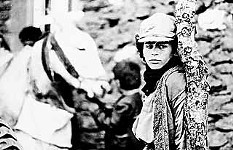
Turtles Can Fly
2004, NR, 95 min. Directed by Bahman Ghobadi. Starring Soran Ebrahim, Avaz Latif, Saddam Hossein Feysal, Hiresh Feysal Rahman, Abdol Rahman Karim, Ajil Zibari.
REVIEWED By Marjorie Baumgarten, Fri., May 27, 2005
The film opens with striking images of the men of a rural Kurdistan village scattered across the rocky terrain that lies beyond the community’s outskirts, each man standing with his own TV antenna, twisting their bodies and the spindly metal in every direction as they strain to pick up a news signal. It’s a few weeks before the American invasion of Iraq, and they are anxious for information. The sight looks like some primitive man-and-machine windmill farm, while a conveyor line of bodies stretches back to the village shouting directions like "a little more to the left," although no one seems to be having much success with getting a signal. Such is the shape of the Information Age in Kurdistan, an ill-defined territory whose borders extend into the countries of Turkey, Iran, Iraq, Syria, and Russia. Borders are always up for dispute; political decrees and warfare often separate families and spouses. Poetically powerful images such as this dot this film, which is good because without their beauty and lyricism, Turtles Can Fly might be too horribly bleak and heartbreaking to bear. The film is a marvelous achievement – the first narrative feature to come out of postwar Iraq and financed in a groundbreaking partnership between Iran and Iraq. Turtles Can Fly directs its focus toward the most defenseless victims of war: children. Most of the movie is seen through their eyes. Yet unlike the Iranian films that have become so famous in recent years for telling stories starring child protagonists who are used as allegorical stand-ins for the things that adults are prohibited from discussing publicly, in Turtles Can Fly it feels as though what we are witnessing is thoroughly documentary-based instead of allegorical. Here we see the orphaned and maimed children of the villages and refugee camps, organized into their own self-protective societies, digging up land mines to barter for cash and weapons, and scavenging for smaller gas masks to fit over their little faces. Into the commotion of the men with the antennas comes Satellite (Ebrahim), a 13-year-old boy who is a savvy hustler of goods and de facto leader of the children. He talks the men into acquiring a satellite dish, which he then installs for them, although none of them can understand the American news broadcasts once they do receive the signal. Then into Satellite’s life comes Agrin (Latif), a beautiful young girl, with whom he becomes smitten. She arrives at the camp with her older brother, a seer of the future who has been rendered armless by a land mine, and a toddler. We have seen Agrin in the film’s preamble by a lake, perhaps contemplating suicide, so her appearance creates further tension for the viewer. Eventually, the harrowing circumstances that cause her to be suicidal are revealed, although the knowledge does nothing to forestall the inevitable. It’s like the U.S. troops when they arrive (captured by Ghobadi with handheld digital): there to save the day but too late to fix the lives of these children. With his third feature (following A Time for Drunken Horses and Marooned in Iraq), Ghobadi, an Iranian Kurd filmmaker, is well on his way toward creating a poetic and powerful national cinema of Kurdistan. His use of nonprofessionals here and the sparseness of his imagery sometimes lead to uneven storytelling, but his film’s urgency and acute realism make it an emotional triumph.
A note to readers: Bold and uncensored, The Austin Chronicle has been Austin’s independent news source for over 40 years, expressing the community’s political and environmental concerns and supporting its active cultural scene. Now more than ever, we need your support to continue supplying Austin with independent, free press. If real news is important to you, please consider making a donation of $5, $10 or whatever you can afford, to help keep our journalism on stands.
June 30, 2024
Turtles Can Fly, Bahman Ghobadi, Soran Ebrahim, Avaz Latif, Saddam Hossein Feysal, Hiresh Feysal Rahman, Abdol Rahman Karim, Ajil Zibari









